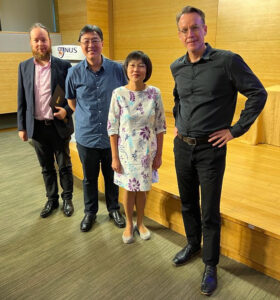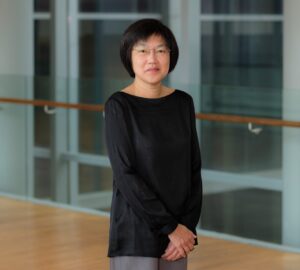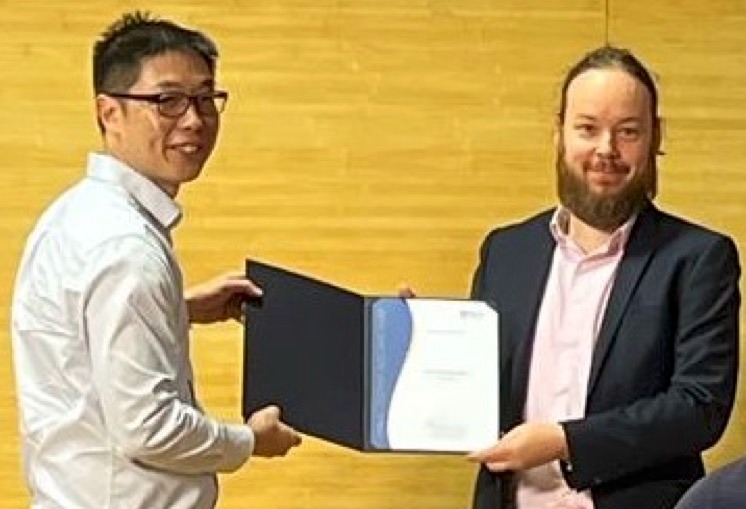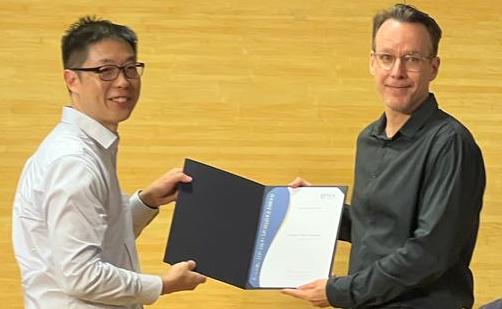Three Tembusu Educators Win University Level Awards

On 27th September, three Tembusu College Fellows were recognised for excellence in their teaching at the Outstanding Educator Award Public Lecture and University Teaching Award Ceremony: Associate Professor Lee Kooi Cheng (previous Deputy Master), Dr Eric Kerr (current Director of Residential Life) and Dr Connor Graham (current Director of Studies). They are pictured here at the Award Ceremony with Associate Professor Ho Chee Kong, Master of Tembusu College.
Outstanding Educator Award: Associate Professor Lee Kooi Cheng

As Director of the Centre for English Language Communication, Associate Professor Lee is known for driving the conceptualisation and designing of courses that integrate disciplinary knowledge with writing, thinking and communication competencies, through partnerships with university faculties and departments. Associate Professor Lee stresses the importance of relationships in her teaching and educational leadership, emphasising the role of university faculty members in developing connections with others that are more than transactional in educational contexts. Drawing on evidence from student feedback and inteviews she has shown how students value competency and a willingness to build relationships with them. She in particular emphasises the importance of cultivating supportive relationships between faculty and current students, among current students, and between faculty and alumni. A relationship-focused higher education means listening and spending time with others, being open to discussion and, being tolerant when mistakes are made.
“Kooi Cheng is an accomplished teacher of English language communication who emphasises partnership, collaboration, and relationship-building, which she credits as the key to sustained learning. Over the years, her teaching has made an enduring impact on her students, who have appreciated her subject expertise, as well as the high level of empathy she brings to the classroom.
Kooi Cheng has played a key role at NUS not only as a mentor and educator to many, but in her remarkable contributions to literacy programmes, curriculum development, and educational leadership. Her various leadership positions include Master of King Edward VII Hall, Deputy Director of the Centre of Development of Teaching and Learning, Deputy Master of Tembusu College, and, currently, Director of the Centre for English Language Communication and Master of Helix House.
In these roles, Kooi Cheng has continually championed out-of-classroom learning to afford students holistic growth and greater autonomy in their time at NUS. Her efforts have centred on conceptualising, implementing, and studying the impact of living-learning programmes.”
Outstanding Educator Award Citation
Annual Teaching Excellence Award:
Dr Eric Kerr

“Dr Kerr believes that the challenges students face today require an interdisciplinary ethos, core competencies in soft skills, and digital literacy, culture, and ethics. In his teaching, he empowers students to cross disciplines confidently, with the rigour, clarity, and versatility of thought to take on new skills, methods, concepts, tools, and insights from other approaches. His strengths lie in his passion for knowledge and learning, which he models for his students, and the patient and methodical process that he brings to thinking through complex issues.”
Residential College Teaching Excellence Award Citation
Dr Eric Kerr teaches interdisciplinarity as an ethos and as a way of thinking, through formal seminars in a residential college and in out-of-classroom settings. He aims to empower students to cross disciplinary boundaries with confidence by emphasizing—and supporting the development of—clarity of expression, versatility of thought, and adaptability to new skills, concepts, and insights. He uses social media platforms to engage students in course content, respond constructively to feedback from peers, and find and analyze connections to other relevant media. He makes use of recent research in learning environments to design online and in-person environments where students can learn to articulate their ideas as individuals and working collaboratively.
Annual Teaching Award:
Dr Connor Graham

“Dr Graham’s teaching statement stands out for his ongoing deep reflection on how teaching and research interact to promote student learning, both in his individual and team teaching, as well as in his educational leadership at Tembusu College. In his most recent intervention in instructional design, assessment and feedback, he tasks students with an impressively broad array of endeavours, including independent inquiry, experimental design, college-wide events, and reports which may have a wide range of styles including quantitative elements and national policy recommendations. Common themes in student feedback are “insightful feedback”, “support”, “helpful consultations,” and “care for student learning.”
Residential College Teaching Excellence Award Citation
Dr Connor Graham relates teaching with research in a residential context through small-scale research activities and connecting students to research culture, developing a sense of important research values in the process. His use of the Oxford tutorial format where students present their work to one another supports student learning through projects that simulate research. His approach resulted in improved student performance in assessments requiring analysis and synthesis and supported students developing positive perceptions of feedback and consultations received. His use of the public spaces in the College supports wider-scale community engagement with students’ work.

